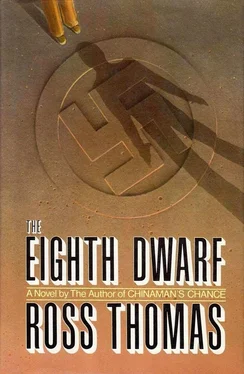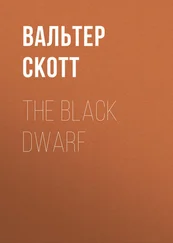“I’ll tell him that,” Jackson said.
“I don’t mean to be overly inquisitive,” Leah said, “but could you tell me what he was doing that was so important that it would have kept him from our meeting today?”
“Sure,” Jackson said. “He was out looking for your brother.”
Eva Scheel accompanied Jackson to the foyer, opened the door for him, and held out her hand. When he took it, she said, “I really hesitate to say this again, Mr. Jackson, but you can rest assured that nothing that was said here today will get back to Lieutenant Meyer.”
Jackson nodded thoughtfully. “There’s not really just a hell of a lot to tell him, is there?”
“No,” she said slowly, the half smile back on her face. “As you say, not a hell of a lot.”
They said goodbye then, and Eva Scheel watched as Jackson made his way down the dimly lit stairs. So there goes the opposition, she thought. Very quick, very intelligent, and doubtless very competent, but lacking, perhaps, in a certain amount of animal cunning. It could be that the dwarf supplies that. Well, printer, she thought as she turned and closed the door, we must meet again, and soon, because now I have something to tell you. She found herself quite surprised at how much she was looking forward to it.
In the dream, Heinrich Himmler was only a meter away. And in the dream it was always raining as Kurt Oppenheimer slowly drew the pistol from the pocket of his SS greatcoat, the belted leather kind; aimed; and squeezed the trigger. Then, in the dream, there was always the business of deciding whether to shout it in Latin or German. Sometimes it was one and sometimes the other, but most of the time it came out in Latin — “Sic semper tyrannis” — just before he squeezed the trigger of the pistol: which he knew would never fire. And it was always about then that Himmler smiled and became someone else. He became Kurt Oppenheimer’s father, who frowned and demanded to know why his son was standing there on the street with no clothes on. After that Kurt Oppenheimer would look down at himself and discover that he was cold and wet and naked. Then he would wake up.
In reality, it had been raining that day in Berlin, and he had been wearing the stolen belted leather SS greatcoat, plus the rest of the uniform of an SS captain, and there had been a pistol in his pocket. A Lüger. He had been standing there in a group of SS officers when Himmler got out of the car.
He and the Reichsführer had looked at each other from less than a meter away. But there had been no shout, and the pistol had remained in the greatcoat’s pocket, because Kurt Oppenheimer had suddenly realized what he had long suspected: that he was afraid to die.
Sometimes when he awoke from the dream, as he did now, lying on the cot in the cellar of the ruined castle near Höchst, Oppenheimer would compare the dream with what had actually happened. In the dream he felt shame. But the shame came from standing naked in front of his father. Had it been shame he felt when he turned away from Himmler, the pistol still unfired in his pocket? No, not shame. The shame happened only in the dream. In reality, there had been that great surge of relief when he realized that he would do no dying that day.
After that January 19 of 1945, the day he had turned away from Himmler, he had also turned away from killing. He had gone back to living in the bombed-out ruins and scrounging food wherever he could. Then there was that air raid in early May. Had it been the last one of the war? He wasn’t sure, because there had been the explosion, he remembered that, and then he remembered very little until he heard the voices debating whether it was worth the effort to dig him out because he was probably already dead.
He had shouted something then, or tried to, and they had dug him out. He was unhurt except for a few scratches. He learned then that the Russians had taken Berlin and that the war was over. He told the men who had dug him out that he was very hungry and thirsty. They gave him some water, but they couldn’t give him any food, because they had none. Nobody had any food, they told him. Nobody but the Russians. If you want food, go see the Russians. Then they had laughed.
But he didn’t seek out the Russians. They were after him, the Russians. Because of the Himmler thing. They had learned about it. How? Well, the Russians had their ways. Now they were combing the city for him. When they found him, they would arrest him and try him for cowardice. He would be found guilty and then they would shoot him. He would suffer a long time before he died.
A part of him always knew that his fears were groundless. This part of him, the mocking part, would stand aside as he cowered in some bombed-out ruin and with biting logic explain all about the irrationality of his fears. Finally, the fears began to go away and depression set in. The mocking part of him was not nearly so adept at dealing with depression. About all that this mocking self could tell him was that he was slightly mad. But then, he already knew that.
Sometimes, however, the depression would immobilize him for days at a time. He would sit, virtually motionless in whatever ruins he happened to find himself in, with his knees drawn up and his arms wrapped tightly around them. During these times he would neither sleep nor drink nor eat.
It got better in early June after he killed the rat. He killed it with a stone, skinned it, cooked it, and ate it. For nearly a week after that he lived on rats. They gave him enough strength to go poking about in the destroyed building in which he found himself. In a heap of rubble that once had been a bathroom he discovered a piece of broken mirror and looked at his reflection for the first time in more than a month. He started laughing. It went on for a long time, the laughter, and although at the end it may have turned into a kind of hysteria, when it was all over he felt better. Much better.
In fact, he felt so much better that he dug around in the rubble of what had been the bathroom and found a straight razor, a brush, and a cracked, gilt-embossed shaving mug with just a bit of soap left in its bottom. He walked three blocks to the nearest water, brought back a large tin of it, and shaved off his beard, cutting himself only twice in the process.
He didn’t eat rats after that. Instead, he stole food when he could, and when he wasn’t doing that he wandered aimlessly about Berlin. After a week or so of this he no longer even trembled at the sight of a Russian soldier, although somewhere far deep inside he remained totally convinced that each Russian soldier had orders to arrest him on sight. When his mocking self told him, for at least the hundredth time, that this was madness, he would reply, sometimes aloud, “Well, it just possibly could be true.”
On July 2, 1945, he noticed a group of gawkers standing at a corner, so he joined them, as he nearly always did. The object of the gawkers’ curiosity was a jeep. In it were two American soldiers, obviously lost. They were the first American soldiers that the gawkers had seen, and they belonged to the Second Armored Division, which had finally entered Berlin that morning.
One of the soldiers was a big man of about thirty with flaming red hair. He wore a carefully trimmed pirate’s beard and the stripes of a master sergeant. Next to him, behind the wheel, was another sergeant, a three-striper with smart, bitter eyes and a mouth that snapped open and shut like a purse.
The red-haired Master Sergeant was examining a map. The other Sergeant was smoking a cigarette. He flicked the butt away and watched idly as the gawkers scrambled for it.
“I told you that was the wrong fuckin’ turn,” he said to the Master Sergeant.
“Ask them,” the Master Sergeant said.
Читать дальше












